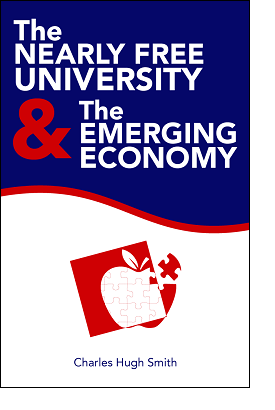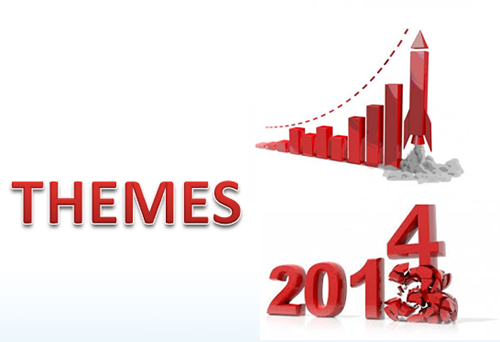When Risk Is Separated From Gain, The System Is Doomed
If the gambler has no feedback from his bets because the casino reimburses his losses, then he will continue gambling wildly and losing spectacularly.
Risk is an ever-present characteristic of life; it cannot be eliminated, it can only be masked or hedged. We know this intuitively, yet we blithely accept official assurances that risk can be eliminated by the monetary machinations of the Federal Reserve, the Central Bank of China, the Bank of Japan and the European Central Bank.
To confuse masking risk with the elimination risk is the acme of hubris and the perfect setup for disaster. In my view, the global central bank response has been directed at masking risk and presenting this as the "solution" that has sent risk back to its lair, defeated. But cloaking risk does not eliminate it; official obfuscation merely pushes risk beneath the surface where it accumulates unseen.
Once the built-up risk reaches criticality, it explodes in "unforeseen" volatility that is often triggered by a seemingly unimportant event.
One way that risk is systemically and deliberately hidden is by separating it from the gain or loss that results from taking the risk. This is also called "moral hazard," and the example everyone now knows is private banks that "privatized profits and socialized losses" by keeping their outsized profits skimmed in the go-go years and transferring their staggering losses to the public ledger.
From the point of view of risk analysis, the risk of losses from malinvestment and speculation were separated from the gains. The banks kept the gains but then diverted the losses (risk) to the taxpayers via the $14 trillion TARP bailout and $16 trillion in "secret" subsidies and give-aways only revealed by a FOIA release of 30,000 pages won by Bloomberg.
We can understand this disconnect as the severing of the feedback loop from risk to gain. If the gambler has no feedback from his bets because the casino reimburses his losses, then he will continue gambling wildly and losing spectaularly. After all, why not?
This explains why the Fed and the Obama administration will not just fail, but fail spectacularly: not only are they individually distant from the risks incurred by their policies, those entities they are protecting (the banking sector, the higher education cartel, sickcare, etc.) are also protected from risk.
Without feedback (we might also call it the possibility of loss or defeat), the players and the system are both intrinsically doomed to failure. There is no other end-state possible if you start from this initial condition.
Thanks to globe-trotting correspondent Toby B., who sent me the book and several other fascinating histories, I have read a deeply insightful history of the pivotal battle of Midway, June 1942: Shattered Sword: The Untold Story of the Battle of Midway.
The book is unique among war histories in that it explores the culture and internal conflicts of the Japanese Imperial Navy which contributed (as initial conditions) to the unexpected defeat at Midway by the inferior forces of the American Navy.
Having studied Japanese history, language, geography and literature in university, the culture of the Imperial Navy was not entirely new ground. But the internal conflicts over differing strategies in the Japanese central command and Imperial Navy were new and of great interest, for they reflected not just Japanese culture but (not unexpectedly) human nature.
Japan's remarkably decisive successes in the first months of the Pacific war left the high command with the unusual problem of "what do we do next?" Having achieved all their tactical goals, debates raged over what to attempt next.
Admiral Yamamoto, the chief architect (though by no means uncontested) of Japan's strategy, opted to draw out America's aircraft carriers into a "decisive battle"--the heart of Japanese Naval doctrine. He devised the Midway campaign to do exactly this.
After such an amazing string of victories over the American, Dutch and British navies following Pearl Harbor, the idea of defeat did not enter the computations or the debates, nor did the idea that all the various strategies proposed were highly risky.
The denial and disorientation caused by the catastrophic loss of Japan's four finest aircraft carriers in a single day did not deter the Japanese commanders from pressing on to Midway; their mindset did not allow for defeat, and so they had no choice but to press on to victory.
Eventually Admiral Yamamoto conceded the campaign had failed to reach its objectives--destroy the U.S. aircraft carriers and capture Midway Island, and that pressing on would only endanger what was left of the Japanese fleet.
All of this struck me as absolutely telling in regards to the Fed's campaign to restart the U.S. economy by lowering interest rates to zero and flooding the system with free, cheap money (liquidity). The strategy is simple: drive the cost of borrowing money so low that people will once again buy homes with 3% down payments and huge mortgages, and plow their money into the stock market, the asset class (along with real estate) which is inflated monthly as an official Fed policy.
This is the Fed's strategy: drive "risk assets" like stocks up until some magical point is reached and households feel wealthy and confident again, and start borrowing and spending with abandon. The fact that only 10% of U.S. households own enough stock to expereince this "wealth effect" simply doesn't register in the Fed's mindset: risk has been eliminated and thus victory is assured.
The idea that this strategy is flawed does not occur to the Fed leadership; this mindset is so narrow and atrophied that the Fed has no alternative but to "press on to victory," even as the ship is sinking beneath them.
The same can be said of President Obama, who appears unable to grasp that his policies have been catastrophically misguided.
I suspect 2014 will be the year--after five long years of the same battle plan--that the total and complete failure of this strategy will be revealed to all. The Fed and Obama administration are steaming their flagships toward the booming guns on the horizon, confident of victory even as the undetected squadrons of risk are high above, setting their bombsites on the foaming white wakes of hubris below.
This essay was drawn from Musings Report 47, one of the weekly reports sent exclusively to subscribers and major contributors (i.e. those who contribute $50 or more annually).
The Nearly Free University and The Emerging Economy:
The Revolution in Higher Education
Reconnecting higher education, livelihoods and the economy

We must thoroughly understand the twin revolutions now fundamentally changing our world: The true cost of higher education and an economy that seems to re-shape itself minute to minute.
Things are falling apart--that is obvious. But why are they falling apart? The reasons are complex and global. Our economy and society have structural problems that cannot be solved by adding debt to debt. We are becoming poorer, not just from financial over-reach, but from fundamental forces that are not easy to identify. We will cover the five core reasons why things are falling apart:
 1. Debt and financialization
1. Debt and financialization2. Crony capitalism
3. Diminishing returns
4. Centralization
5. Technological, financial and demographic changes in our economy
Complex systems weakened by diminishing returns collapse under their own weight and are replaced by systems that are simpler, faster and affordable. If we cling to the old ways, our system will disintegrate. If we want sustainable prosperity rather than collapse, we must embrace a new model that is Decentralized, Adaptive, Transparent and Accountable (DATA).
We are not powerless. Once we accept responsibility, we become powerful.
Kindle: $9.95 print: $24
Read more...





























